- Home
- Bruce Sterling
Zeitgeist
Zeitgeist Read online
Praise for the novels of
BRUCE STERLING
DISTRACTION
“Classic Sterling.”—The Washington Post
“Distraction is more than a futuristic political thriller; it is Sterling’s persuasive vision of a social revolution that is as much biotechnological as philosophical in scope.… He reserves a killer blow for the most familiar thing of all: the way we think.”—The Village Voice
HOLY FIRE
“A haunting and lyrical triumph.”—Time
“Holy Fire is a book made entirely of big ideas.… An intellectual feat, it is also a treat for the spirit and the senses.”—Wired
“A patented Sterling extra-special.”—Newsday
HEAVY WEATHER
“A remarkable and individual sharpness of vision … Sterling hacks the future, and an elegant hack it is.”—Locus
“So believable are the speculations that … one becomes convinced that the world must and will develop into what Sterling has predicted.”—Science Fiction Age
ALSO BY BRUCE STERLING
NOVELS
DISTRACTION
THE ARTIFICIAL KID
THE DIFFERENCE ENGINE
with William Gibson
HEAVY WEATHER
INVOLUTION OCEAN
ISLANDS IN THE NET
SCHISMATRIX
HOLY FIRE
STORIES
CRYSTAL EXPRESS
GLOBALHEAD
A GOOD OLD-FASHIONED FUTURE
NONFICTION
THE HACKER CRACKDOWN:
LAW AND DISORDER ON THE
ELECTRONIC FRONTIER
EDITOR
MIRRORSHADES:
THE CYBERPUNK ANTHOLOGY
This edition contains the complete text
of the original hardcover edition.
NOT ONE WORD HAS BEEN OMITTED.
ZEITGEIST
A Bantam Spectra Book
SPECTRA and the portrayal of a boxed “s” are trademarks of Bantam Books, a division of Random House, Inc.
PUBLISHING HISTORY
Bantam hardcover edition published November 2000
Bantam mass market edition / August 2001
All rights reserved.
Copyright © 2000 by Bruce Sterling.
Library of Congress Catalog Card Number: 00-29270.
No part of this book may be reproduced or transmitted in any form or by any means, electronic or mechanical, including photocopying, recording, or by any information storage and retrieval system, without permission in writing from the publisher.
For information address: Bantam Books.
eISBN: 978-0-307-79679-0
Bantam Books are published by Bantam Books, a division of Random House, Inc. Its trademark, consisting of the words “Bantam Books” and the portrayal of a rooster, is Registered in U.S. Patent and Trademark Office and in other countries. Marca Registrada. Bantam Books, 1540 Broadway, New York, New York, 10036.
v3.1
Contents
Cover
Also by Bruce Sterling
Title Page
Copyright
Chapter One
Chapter Two
Chapter Three
Chapter Four
Chapter Five
Chapter Six
Chapter Seven
Chapter Eight
Chapter Nine
About The Author
SUMMER IN ISTANBUL. ROSES IN A HAMMERED SILVER urn. Fresh-ground coffee in a shiny brass hand-mill. The rich tang of fertilizer and fuel oil hung over the damaged café. Starlitz could smell the hot caramel aftertaste of the car bomb, right through the baked metal, smashed cement, and burnt upholstery.
“Where are the girls?” said the Turk.
“The girls are in Cyprus. They’re partying.”
“With Greeks?”
“Oh, heavens no,” Starlitz assured him. “The girls are in the fun part of Cyprus. Turkish Cyprus.”
The Turk smiled. He picked open the lid of the coffeepot and deposited a heaping spoon of brown sugar.
Starlitz leaned back in his wrought-iron chair and folded his plump hands over his lilac waistcoat. He and the Turk sat in companionable silence, with hooded eyes behind their designer shades, and watched the pot reach a boil.
The Turk, who called himself Mehmet Ozbey, was young, and rich, with a film star’s good looks. In his Italian leather jeans and camel-hair jacket, Ozbey was the picture of masculine chic.
Starlitz felt at peace. Local events were going very much his way. There had been a time in his checkered career when he would have shown up in Istanbul two days before a car bomb. He would have hit town with the plan, and the contacts, and the agenda, and he would have found the old city strained and jittery with fatalistic Ottoman tension.
Here at the tag end of the twentieth century, however, Starlitz was pampered by circumstance. He had arrived in Istanbul two days after a car bomb. The catastrophe was behind them now. They had entered the professional realm of consequence management. Bored Turkish cops measured their new monster pothole with yellow metal pull-tapes. Indifferent janitors swept up the scattered tonnage of broken glass. Istanbul downtown girls, in their chunky gold chains and Chanel suits, were trying to window-shop through the street’s battered length of plywood sheeting.
Mere domestic terrorism could not cause Mehmet Ozbey to break a business appointment. The shrapnel-damaged café was almost deserted, but the young pop promoter had arrived bang on time, clean, shaved, sober, and toting a white calfskin valise. The café Ozbey had chosen was lovely, though its windows had all been shattered by the car bomb’s concussion. The café staff doted on Ozbey, touched by his loyalty during their trying circumstances. They kept tiptoeing up to offer lacquered trays of sliced melon and baklava.
A young woman passed the damaged café and caught sight of Ozbey. Instantly entranced, she stumbled headlong into a striped police sawhorse.
“My little girlfriend Gonca,” Ozbey remarked solemnly, “would very much like to meet your G-7 girls.”
“I’m sure that can be arranged.”
“She’s especially fond of the French One.”
“Everyone has a favorite G-7 girl,” Starlitz allowed.
“The French One has the most talent,” said Ozbey judiciously. “She can almost sing.”
Starlitz nodded. “Yeah, that’s her Left Bank café chanteuse riff.”
Starlitz and Ozbey watched the pot foam up, once, twice, and the full and traditional third time. Starlitz was pleased to have stolen this moment from the onrushing millennium. It was important to pry these little breathing spaces from the final hum of the dying century. It was good for him, like oxygen.
Ozbey removed the curved pot from its flickering burner, and with exaggerated hostly care he began to pour.
“Why is there no Russian G-7 girl?” Ozbey said, setting the pot aside. “Because it’s the Group of Eight now, officially. With Russia.”
“That’s an odd thing,” said Starlitz, accepting his cup. “No one ever asks me why we have no Russian girl in the group. Unless they’re Russian.”
“You don’t like Russians, Mr. Starlitz?”
“I fucking love Russians,” Starlitz said politely, “but Russians just don’t get it with the tie-in merchandising angle. They still think that a pop group has to sell music.”
Ozbey removed his shades, folded them fastidiously, put them in an inner jacket pocket. He lifted his gleaming demitasse and gazed at Starlitz across its gilded rim. “ ‘Selling the whole concept,’ ” he quoted.
“Right you are.” Starlitz savored a sip. He rinsed his molars with the coffee grounds. That subtle flavor of cardamom. Business was good.
Ozbey cocked his freshly coiffed head. “We sell the big picture. W
e sell the whole bag of wax.”
“It’s the spirit of the times.” Starlitz nodded. “It’s the soul of postmodernity.”
“We sell little plastic dolls, for instance.”
“ ‘G-7 action figures,’ ” Starlitz corrected.
“They’re very popular with children. And the lip gloss. The candies. Those very big shoes that they wear.”
“Yeah, G-7 WonderBras, G-7 pantyhose—the tie-in apparel thing has definitely been a breakthrough area for us.”
Ozbey put his cup down and leaned in intently. “Who is your supplier? For the clothes.”
“Indonesia, mostly,” said Starlitz. “Before the currency crash.”
Ozbey placed his jacketed elbows on the polished marble tabletop. “My Uncle the Minister,” he announced, “has many interests in the Turkish apparel trade. He is very influential in domestic Turkish manufacturing.”
“You don’t say.” Starlitz scratched his double chin thoughtfully. “That’s very interesting.”
“My Uncle the Minister has extensive interests in the Turkish Republic of Northern Cyprus.”
“The Republic is a very interesting place,” said Starlitz, leaning forward in tandem. “After just one week on the ground in Turkish Cyprus, I could tell that it’s a country of tremendous opportunity.”
Starlitz lifted one meaty hand in mock demurral. “Yes, I know—some people claim that the Greek half of the island has a better tourist industry. But if you ask me, the Greek scene in Cyprus is yesterday. They’re all overbuilt and tapped out. All those nightclubs, and the rave scene, and the big cruise ships in from Beirut …”
“Let me show you the Meridien,” said Ozbey. “Turgut Altimbasak’s casino in Girne. That establishment is very … what is the English word?”
“ ‘Suave’?”
“Yes! Very suave, very international-playboy. Mr. Altimbasak is a friend of my uncle’s. You could gamble freely there, Mr. Starlitz. You could run a big tab.”
Starlitz considered this bold proposal. It was very much to his liking. “Call me Lech,” he said.
“Okay!” grinned Ozbey. “You call me ‘Mehmetcik.’ Mehmetcik, it’s like ‘Johnny.’ ”
“Mehmetcik, my friend, let’s be frank together,” said Starlitz, steepling his big blunt fingers. “In the past we in G-7 were very displeased with our offshore accounts in Jersey and Bimini. But then you brought those Turkish Cypriot banks to our attention. Your Uncle the Minister had a few helpful words there. It’s all very smooth now. That broke up the red tape. My accountant’s very happy about all this.”
“It’s good to have happy accountants,” said Ozbey. “We should all have happy accountants.”
“We can all be very happy doing business together,” Starlitz said. “As long as we always remember the number-one G-7 rule.”
“The number-one rule is that everything shuts down before the year 2000.”
Starlitz leaned back in contentment. “Mehmetcik, I knew you were special from the first time you sent us fan mail.”
Ozbey nodded intently. He was shifting gears now, onto his favorite topic, himself. “People tell me that I’m special,” he concurred. “My Uncle the Minister, my wife, my girlfriend, my many good friends in the pop business world—they all say I have a very special gift.”
Starlitz watched as a starstruck Turkish housewife entangled herself in a flat yellow strand of police tape. “Yeah,” he offered.
“I have a gift. Don’t you agree?”
“Absolutely, Mehmetcik. It’s written all over you. It couldn’t be more obvious.”
Ozbey sat up. “And you, Lech. You are also a gifted man. Obviously.”
Starlitz shook his head.
Ozbey’s dark eyes gleamed. “Don’t be shy! People tell me things, behind the scenes. They tell me: This man Leggy Starlitz, he is more than just a businessman. He is an imam. Like they say in Silicon Valley, he’s a business guru.”
“Aw, forget that industry scuttlebutt. Musicians are way superstitious. They’re full of New Age crap.”
“Do you know the future? They say that you do.”
Starlitz shrugged. “Sure I do, sorta. I’m into consumer trends, man. It’s all about pop, right? Demographic analysis. Demand curves. Stoking the hit machine. It’s an Internet thing, basically.”
“Then you do know the future.”
“Aw, crystal balls are for suckers.” Starlitz scowled. “You want some supernatural powers, pal? Find a money laundry. You can work miracles with those things.”
Ozbey frowned. He daintily lifted a wedge of sliced melon, changed his mind about tasting it, and tactfully put it back down. “To speak life’s deepest truths across two languages … It’s very hard to speak about these secret things. There are so many important secrets in life—realities that are never said.”
Starlitz very loudly said nothing. To fill the silence he watched a Turkish crow pick its way across the café’s rooftop. The dusty bird, its trash looter’s eyes like two bullet tips, was shivering with greed. Starlitz surreptitiously dropped a chunk of melon.
Ozbey toyed with the ornate coffeepot. “Please tell me that you somehow understand these secret truths I cannot speak.”
“Mehmet, just put a lid on it, okay? Don’t even go there.”
“But we are business partners. I must be sure you understand. I must be very clear from the beginning.” Ozbey sighed and lowered his voice. “I am a powerful secret master of the modern world’s deeper reality.”
“I’m hip!” Starlitz insisted, wincing. “I’m so hip that you didn’t even have to tell me that you weren’t saying that.”
“You and I can both break the laws of nature at will. We are great adepts with supernatural abilities that fools would find fantastic.” He examined Starlitz with frank concern. “Am I saying too much?”
“Mehmetcik, that dervish crap moves a lot of product in your part of the world, but I’m in a global outfit, so I’m not in the market for it. You’re a heavy operator with a lot of local connections. I know that, I respect that. That and a handshake, that oughta be enough for both of us. Let’s leave the deeper reality under the rug where it belongs.”
Ozbey seemed disappointed, but he was bearing up. “I see you came to my town of Istanbul to talk about the rug business. Yes? It’s nothing but business with Leggy Starlitz. Very well. I am your host, I will be polite. Say no more.”
Starlitz said nothing. The air was heavy with coffee and roses.
Ozbey reached deftly across the table and plucked up Starlitz’s coffee cup. “Since I am your host, let me entertain you. We have an old tradition here in Istanbul. We can read a man’s future in his coffee cup.”
“Hey, I was drinking that,” Starlitz protested.
“I’m very good at this,” Ozbey insisted. He brandished the demitasse with an aggressive grin, ritually swirling the coffee grounds. “What is your future, Leggy Starlitz? Let us see.”
“You don’t want to try that with me,” Starlitz told him.
“Don’t tell me what I want,” said Ozbey calmly. “Save that for teenage girls. I know very well what I want. I know it much better than you.” Ozbey cradled the coffee cup in both his hands. Then he gazed inside it, with a careful squint.
The cup was empty. It was perfectly clean.
THE BLACK RUBBER PLATES OF THE LUGGAGE CONVEYOR track moved with eerie mechanical ease. Jet-lagged passengers appeared in silent clumps, awaiting their gear like the bored parishioners of some failing religion.
An apparition sidled silently past Starlitz. Floppy gray fabric hat, long translucent raincoat over bony shoulders, two camera cases and a folded tripod bag, a lumpy photographer’s vest and multipocketed khaki trousers. The ensemble ghosted through the airport on a pair of high-ankled Adidas monkey boots.
Starlitz tossed aside his glossy copy of Mixmag and rose from his red plastic seat. “Hey, Wiesel.”
Wiesel rotated his narrow head, his pale eyes like gimlets. The paparazzo’s blank face swam
into focus then, and it registered resigned distaste. “Leggy, what are you doing in Istanbul?”
“Is this Istanbul, man? All airports feel the same to me.”
Wiesel shrugged uneasily. “Where are the girls?”
“The girls got a few days off. They’re poolside in a secret hotel. Naked and covered with cocoa butter.”
Wiesel’s sallow face showed a flicker of reflexive interest, but it faded rapidly. “G-7 are yesterday.”
“They’re yesterday in London, man, I agree with you there. In the London scene, fuckin’ tomorrow is yesterday. But spangled hose and lip gloss are the coming thing in Teheran.”
Wiesel examined the passing luggage, feigning indifference. Starlitz, who knew better, watched him weakening.
Wiesel’s eyes flicked up. “You mean to scam the mullahs, Leggy?”
“New regime in Iran, pal. Big window of opportunity there. I need your help again.”
Wiesel detached one swollen camera bag from the shoulder of his flimsy raincoat and set it with care on the floor. “Give it a rest! You and your boss man have nothing left to work with. The gimmick’s two years old. Fuck, they’re not even a band. They can’t sing. They can’t dance. They lip-synch. To tapes.”
Starlitz shrugged.
“They don’t even have names,” Wiesel insisted. “They’re seven random birds you picked up with adverts.”
Starlitz nodded. “All according to plan.”
“You’re gigging the arena circuit for chump change, in deepest, darkest Eastern Europe. There’s just nothing there, lad. You can’t make big stars out of nothing at all.”
Starlitz sighed patiently. “Who needs big stars? Big stardom is poison. This is all about the marketing concept. The first pop group that won’t sell music. The first pop group with an expiration date.”
“Like I said, gimmicks.”
“Lemme tell you about this upcoming Istanbul gig. It’s the first leg of our big Islamic pop tour. The setup behind this one is a thing of genius.”

 Mirrorshades: The Cyberpunk Anthology
Mirrorshades: The Cyberpunk Anthology The Wonderful Power of Storytelling
The Wonderful Power of Storytelling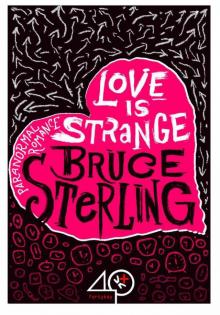 Love Is Strange (A Paranormal Romance)
Love Is Strange (A Paranormal Romance)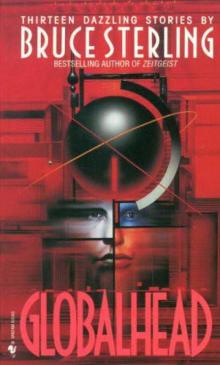 Globalhead
Globalhead Essays. FSF Columns
Essays. FSF Columns The Hacker Crackdown
The Hacker Crackdown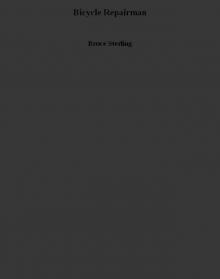 Bicycle Repairman
Bicycle Repairman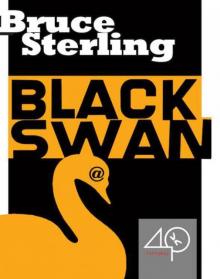 Black Swan
Black Swan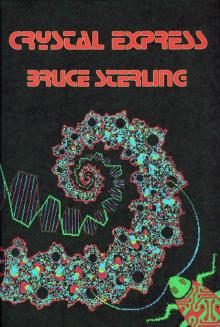 Crystal Express
Crystal Express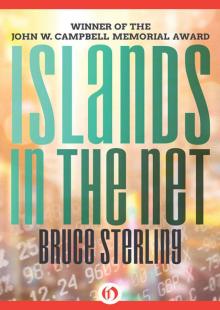 Islands in the Net
Islands in the Net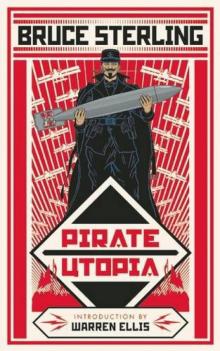 Pirate Utopia
Pirate Utopia GURPS' LABOUR LOST
GURPS' LABOUR LOST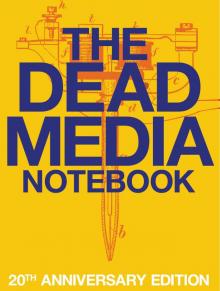 The Dead Media Notebook
The Dead Media Notebook Unstable Networks
Unstable Networks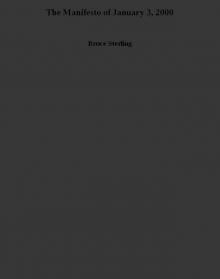 The Manifesto of January 3, 2000
The Manifesto of January 3, 2000 Heavy Weather
Heavy Weather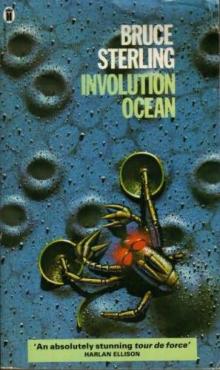 Involution Ocean
Involution Ocean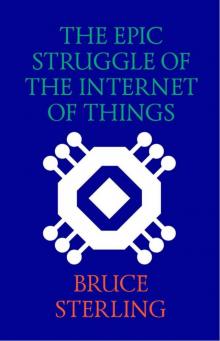 The Epic Struggle of the Internet of Things
The Epic Struggle of the Internet of Things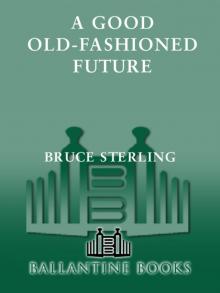 A Good Old-Fashioned Future
A Good Old-Fashioned Future The Littlest Jackal
The Littlest Jackal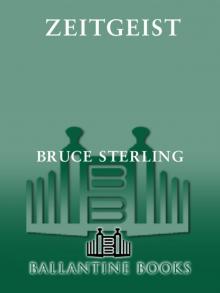 Zeitgeist
Zeitgeist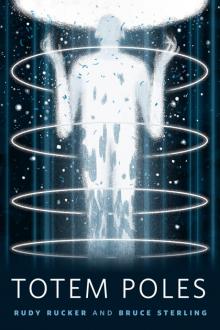 Totem Poles
Totem Poles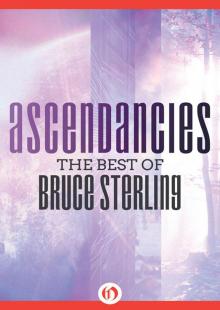 Ascendancies
Ascendancies CyberView 1991
CyberView 1991 War Is Virtual Hell
War Is Virtual Hell Taklamakan
Taklamakan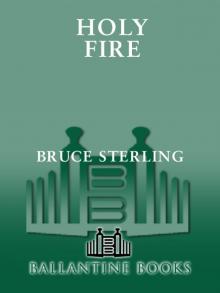 Holy Fire
Holy Fire Cyberpunk in the Nineties
Cyberpunk in the Nineties Schismatrix Plus
Schismatrix Plus The Artificial Kid
The Artificial Kid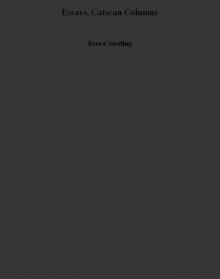 Essays. Catscan Columns
Essays. Catscan Columns Maneki Neko
Maneki Neko Distraction
Distraction In Paradise
In Paradise Red Star, Winter Orbit
Red Star, Winter Orbit Luciferase
Luciferase